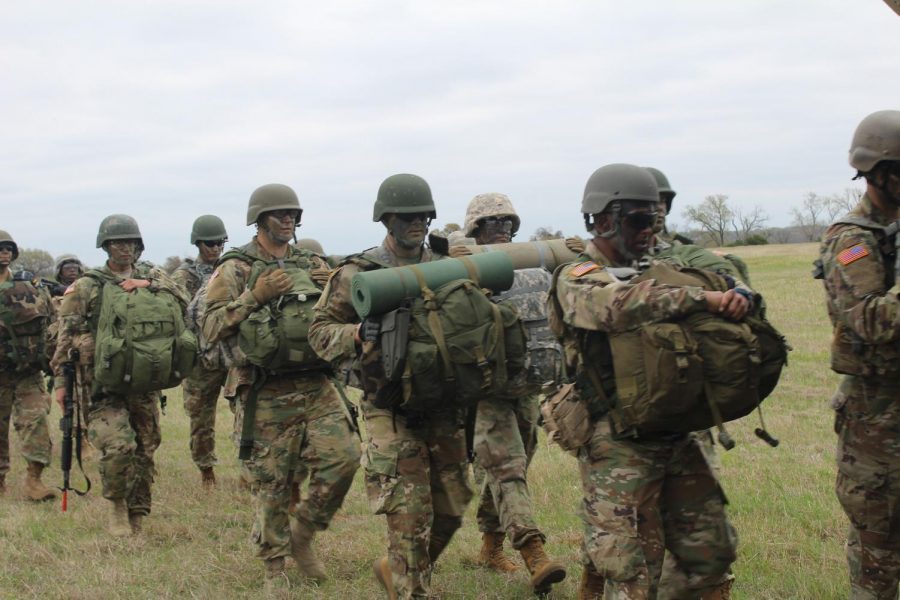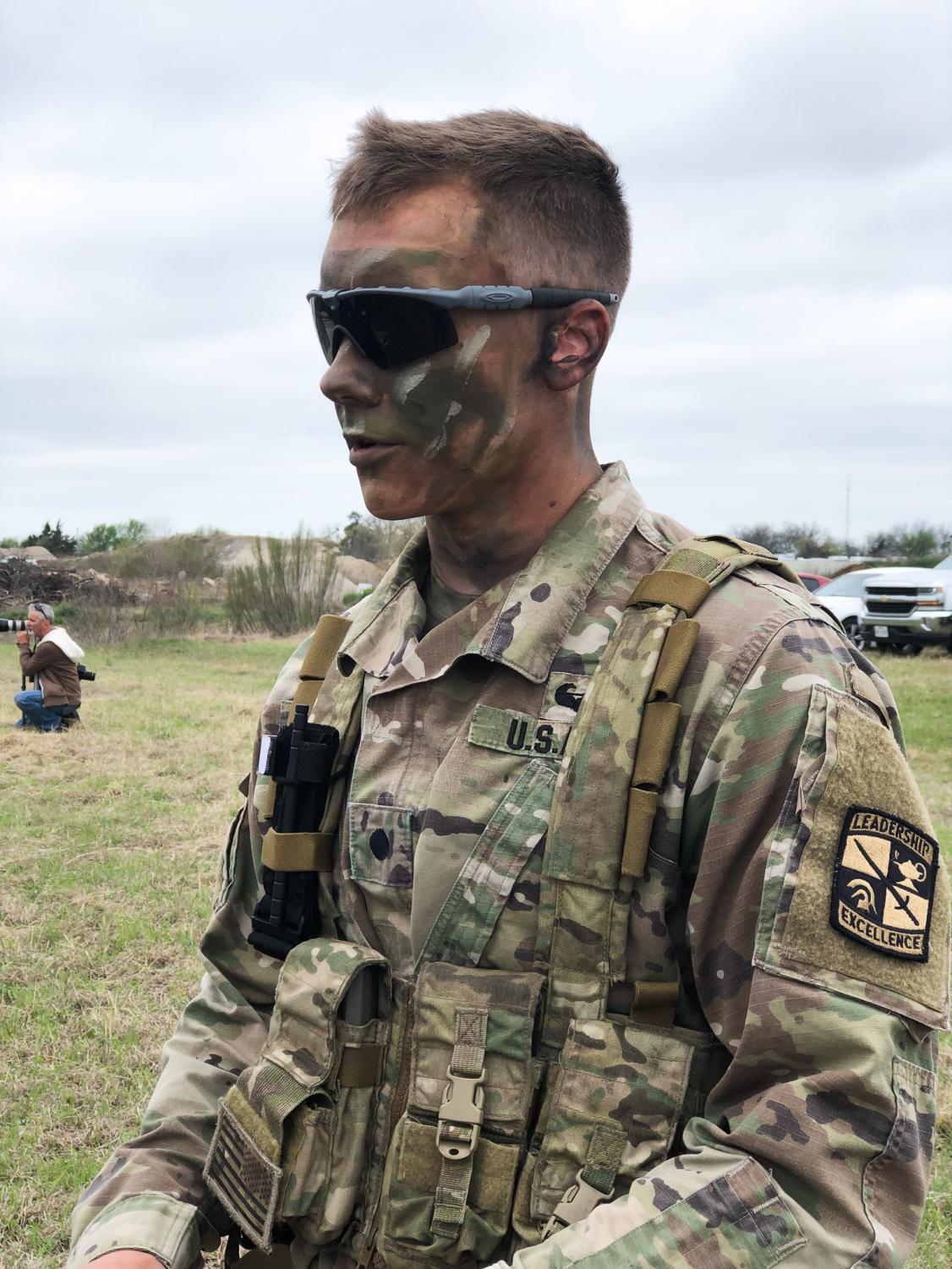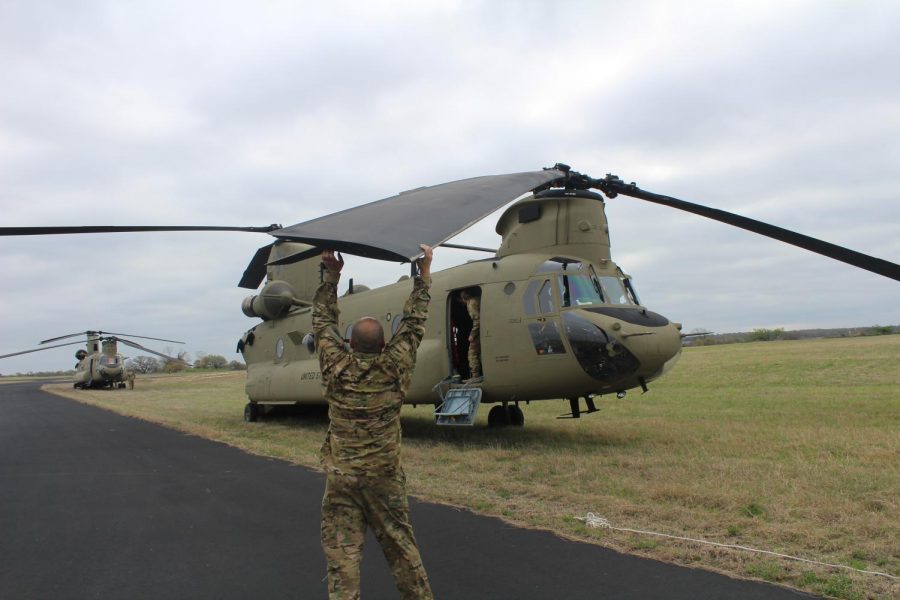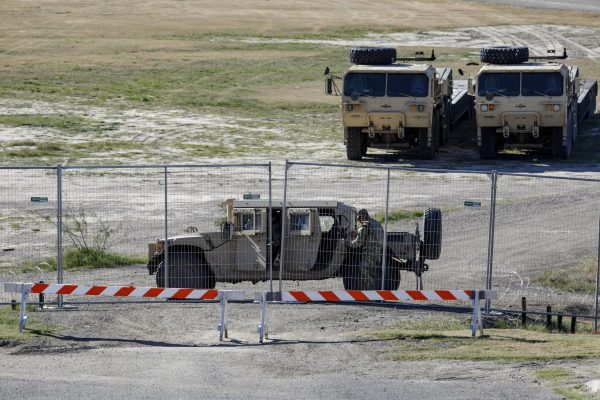Tarleton ROTC hosts spring field training exercise
United States National Guard Airman ties down Chinook plane rotors to the ground due to high winds.
This morning 162 ROTC Cadets from Tarleton State University, Texas A&M University-Central Texas and the University of Mary Hardin-Baylor gathered at Clark Field Municipal Airport in Stephenville, Texas to participate in a field training exercise.
The ROTC students will be flown to Camp Bowie, a United States National Guard training center that is located in Brownwood, Tx. The cadets are going to be transported in two Boeing CH-47 Chinooks and a Sikorsky UH-60 Blackhawk. Once at Camp Bowie, Texas Christian University and Baylor University will join the rest of the cadets and participate in the training exercises.
“Having air assets gives the cadets a more functional understanding of how the army works and more applicable to what we’ll be doing in our future as officers and soldiers,” said Luis Zamora, a senior company commander for Tarleton ROTC. “Once at Camp Bowie, we’ll be doing a mile or so ruck and then begin the field exercises and land navigation.”

Cadets boarding one of the two Chinooks at Clark Field Municipal Airport in Stephenville, Texas.
“This is the first time the university has done an air movement to their FTX (field training exercise),” said Lieutenant Colonel John Bradley, a professor and department head for Military Science. “Normally we bus out in the fall and we do that at Hunewell Ranch, but Tarleton does that alone. This time we’re trying to replicate realistic military training, something they’d actually experience in the army.”
“The focus of our spring field training exercise is the culminating event for our cadets this event this year. It’s culminating for our MS3s because it’s their last opportunity to refine and hone some of their leadership strengths that they’ll be evaluated on this summer during their cadet summer training,” said Bradley. “For our seniors, it’s their last ROTC field training event before their commissioning as second Lieutenants and they take off to develop their core competency in whatever their field will be in the army.”
The MS3s are junior students who have 1 year left in the ROTC program. At the end of spring 2019, 10 Tarleton students in the program will be commissioned as second lieutenants.
“My first permeant change of station will be Ft. Benning for infantry school, ranger school and airborne school and after that I’ll be going to Ft. Bragg for the 82nd airborne division,” said John Zellner, a Tarleton senior and ROTC MS4. “This whole exercise is a preparation for the MS3 to head to advance camp. It’s a little over a month of evaluation. What we’re looking for mainly is that people can make sound and timely decisions under stress. The way we emulate stress is that they’re in a tactical situation. They’re going to be conducting raids, ambushes, attacks and reconnaissance missions. While it is tactics, we’re not looking for them to be tactic savvy per se. But instead that they can make a decision under stress while they’re getting shot at and things of that nature. We’ve done joint FTX in the past, but never at Camp Bowie and never via aircraft like this.”

John Zellner, Tarleton ROTC MS4.
For many of the cadets, this will be their first time inside of a helicopter and their first time flying in a Chinook and Blackhawk.
“I am going to be a military intelligence officer. I’ll be going to Fort Huachuca, Arizona in June and after that will be reading right back to Fort Hood, “said Evon Martin, a UMHB senior getting her master’s in Business Administration. At the end of spring 2019, Martin will be commissioning as a second lieutenant.
“These exercises, especially in the spring are bringing together to bring multiple schools to bring in diversity and different perspectives,” said Martin. ”It’s mainly to get all of our MS3 cadets ready for this summer. We put them through a diverse amount of situations, whether it’s tactics, a call for fire or medical issues. So we try to put them through all the rounds they’ll go through at camp so they’ll be successful.”






